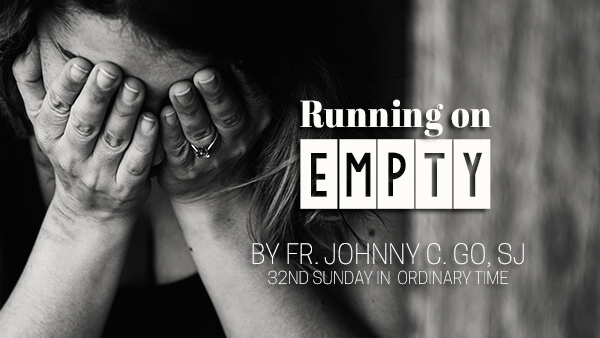


Fr. Johnny C. Go, SJ
32nd Sunday in Ordinary Time
November 12, 2017
Do you feel like you’ve been running on empty? “Running on empty” is a phrase we use to refer to people on the brink of exhaustion–be it physical or emotional. It’s a reference to automobiles running so dangerously low on fuel that it might just stop running any moment now. It basically means you’re on the verge of a breakdown or burnout.
“Running on empty” is a modernmetaphor, but I propose that our Lord’s parable today could be very well about that–even if he told his story long before the invention of automobiles.
Ten virgins–half of them wise and the remaining foolish: What was the difference? The five wise virgins came prepared for the wedding ceremony, with flasks filled with oil for their lamps. The foolish ones–either too busy to prepare or just plain irresponsible–arrived on the scene equipped with oil-less lamps. When the time came for them to meet the bridegroom with lighted lamps, they hoped that the other five would spare them some oil, but there just wasn’t enough.
The ending is predictable. The foolish virgins ended up not only excluded from the wedding banquet, but also rejected by the bridegroom. Its message is clear: Always be ready with your lighted lamps because we never know when we need to meet and greet the Lord.
What is not so clear is: How exactly can we prepare ourselves?
I suggest that one way is precisely to use and extend the Gospel metaphor: How do we prevent ourselves precisely from running on empty? I don’t know if you’ve experienced it, but I myself have certainly “been there, done that.” Sometimes it’s because I’ve simply been too busy working, running around doing too many things, beating too many deadlines. Other times it’s the opposite extreme: I’ve been trying too hard to enjoy myself, trying to hoard as many experiences as possible. Whichever is the case–whether it’s too much work or too much fun–the result is the same: I feel depleted.
So you wonder: Aside from trying to find balance in one’s life, what else could be missing in these two extreme cases? Based on my experience, I think it’s silence. What I mean by silence isn’t just an absence of words or noise, but a space that we create in our lives in order to remain connected with our deepest selves and with God. This is what makes reflection and prayer possible. Without this silence, whatever we are doing, we end up losing track of ourselves. We end up in self-diminishment.
We are, after all, subject to entropy–that natural process of falling apart, that natural tendency that scientists have observed in the universe of things going from order to disorder, from cosmos to chaos. As creatures of time and space, we are subject to this tendency to scatter. Without silence, reflection, and prayer, we’re like the glutton who’s pigging out by swallowing food without bothering to taste any of it, without savoring any of it. As a result, we end up depleting our sense of selves, and we find ourselves running on empty.
One way to respond concretely to the Gospel today is to make a deliberate decision to carve out some space in our lives for silence, for reflection, and for prayer: Just a few minutes every single day that we can devote just being by ourselves and being with God. You’ll be surprised at the self-replenishment that happens.
Actually, you may have heard the rumor; this is exactly why mindfulness is so big these days–it’s a recognition of every person’s need for silence especially in a lifestyle so busy, so full of distractions, and yes, so mindless.
This silence is more important than we may suspect. Blogger Andrew Sullivan has written that silence is “the stillness in which faith needs in order to endure or to be reborn.” What better way to prepare ourselves to meet the Lord than with renewed, enduring faith?